Chickens! Chickens Everywhere!
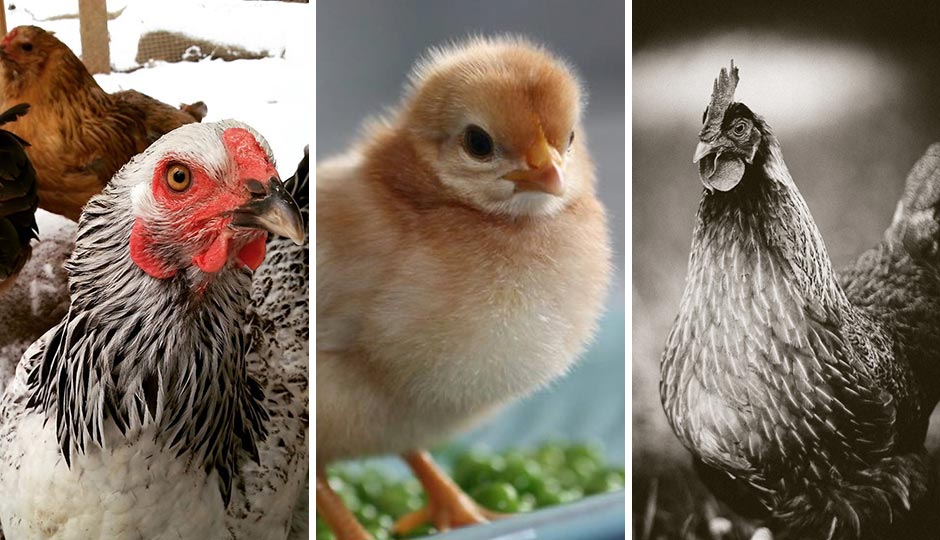
PHILADELPHIA CHICKENS: Photographs, from left, courtesy of Taylor Kyuk-White, Maureen Breen, and Linette
Robert Drake is not usually one to complain. The affable WXPN producer and on-air personality — and part-time weather forecaster — is generally a pretty happy guy and a big city booster. A good egg, as it were. But recently, his feathers were a bit ruffled when his neighbor decided to get some new pets: roosters.
“When they crow, it is really just so painful,” Drake told us back in May, after he first discovered the chickens in a fenced-in South Philadelphia lot belonging to his El Salvadorian neighbors on Dickinson Street in Pennsport. “I was laying in bed at four in the morning and heard this horrible sound in the house. I couldn’t figure out what it was at first, but then I realized that we had some new ‘residents’ nearby.”
Drake was annoyed. Who wouldn’t be when awoken pre-dawn by some belligerent and unwelcome livestock down the street? A few 4 a.m. cock-a-doodle-doos later, Drake contacted Philadelphia’s Animal Care & Control Team (ACCT) to file a formal complaint. And then he called them again.
“It’s not just the noise,” Drake told us. “It doesn’t seem like anyone is caring for these things. No one interacts with them, and they don’t seem to have any feed.”
As the days went by without any official acknowledgment from ACCT about Drake’s complaints, word got out to the neighborhood about the chickens, and people started showing up to gawk at them. And Drake took to Facebook to chronicle the saga, posting photos of the curious onlookers.
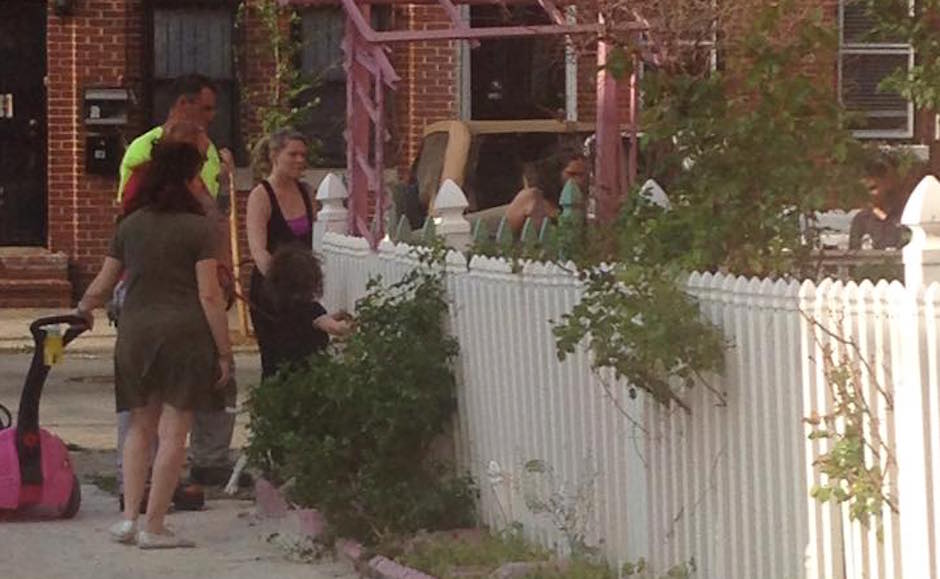
DON’T WAKE THE DRAKE: People gawking at the Fourth and Dickinson illegal chicken display. (Photo courtesy Robert Drake.)
“It’s the weirdest thing,” said Drake. “There’s this constant line of people at 4th and Dickinson who want to see the animals. Parents are bringing their kids in strollers. I’ve never seen so many people fascinated with seeing a chicken. I guess it’s cheaper than the zoo.”
But before long, the little makeshift free South Philly zoo was no more. Drake says that one of his neighbors spotted two ACCT workers nosing around the lot, and within 24 hours, the roosters were gone.
•
KEEPING CHICKENS IN PHILADELPHIA is illegal. Depending on your perspective on the merits of urban chicken-keeping, you can either thank or pelt eggs at nine-term Republican Philadelphia City Councilman Brian J. O’Neill for that.
Back in 2004, the Northeast Philadelphia legislator introduced a measure to ban chickens — with the exception of city homeowners with three or more acres, of which we know none — after he received complaints from constituents about nuisance fowl in the neighborhood.
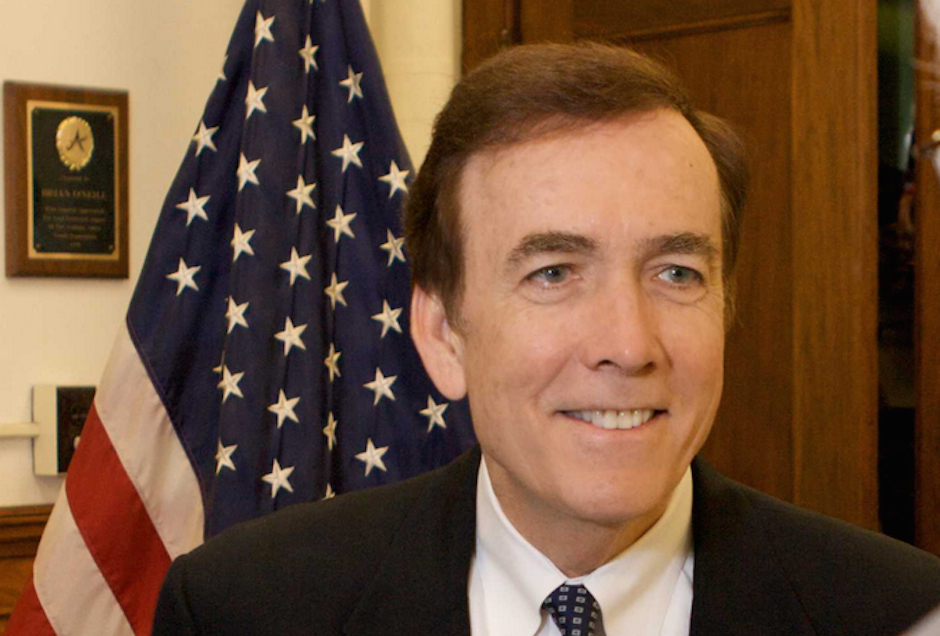
CHICKEN KILLER: Councilman Brian O’Neill wants you to buy your eggs at the Acme. (Official City Council photo.)
At a public hearing, one of those constituents, a woman named Donna Miller, testified that the smell from her neighbor’s chickens was so, ahem, foul that she couldn’t sit out on her front porch and had to keep her windows closed. She also raised the ominous specter of bird flu and E. coli — we must protect the children! — adding that she had a petition with 156 signatures in support of O’Neill’s proposal.
Miller was the only anti-poultry constituent to speak, while several chicken enthusiasts gave testimony, including Jean Smith, a mother of three from Somerton.
“[W]hen city people hear the word ‘chickens,’ hillbilly music starts playing in their heads and they envision chickens crazily running wildly,” she told the members of City Council. “First of all, chickens don’t come with hillbilly music and chickens like to be calm and quiet.”
Smith made a good point when she suggested that instead of banning chickens, the city should simply enforce the various city codes that would prevent an urban chicken-keeper from having putrid smells wafting out of their homes or backyards. The logic went as follows: We don’t ban cars just because some people use them irresponsibly; we enforce the laws that drivers are required to follow. The crowd applauded when Smith invoked the old “don’t throw the baby out with the bathwater” trope.
“Like everything in our lives, raising chickens can be done the right way or the wrong way,” she testified. “There are people living in very dirty situations without an animal in sight. You can have farm animals and do it correctly. You can be clean.”
The chicken-happy Somerton mom presented two petitions of her own before others took to the microphone in defense of urban chickening. But it was all for naught. Council passed the ordinance with a 11-to-6 vote. The ayes had it. And backyard chickens would be thereafter banished from city limits.
•
SO IS O’NEILL JUST a killjoy, or are urban chickens a threat to national security or, at least, public health and happiness? Keep in mind that this is the same conservative councilman who would, two years later, introduce a bill to ban the sale of rolling papers, bongs and blunts, an ordinance that became known as the Philly Blunt Ban and one that was later overturned by the Pennsylvania Supreme Court.
At the time of the City Council hearing into chicken-keeping, O’Neill had said that almost all American cities had adopted legislation against urban farm animals, and he specifically invoked Baltimore’s hard-line stance against backyard chickens. And we certainly wouldn’t want to be more backward than Baltimore. O’Neill was just keeping us up with the times.
This was 2004, after all, and Philadelphia was not yet in the running for Next Great American City. There were no giant hammocks or roller rinks at Penn’s Landing. No bike shares — hell, barely bike lanes. No talk of civic-minded millennials and their impact on Philly’s future. No, Philadelphia was still the punch line of many jokes, the sweaty armpit of American metropolises, and urban hillbillies and their nasty, stinky chickens starting a bird flu pandemic weren’t exactly going to help the cause.
Fast forward to 2015, more than a decade since the ordinance passed, and the urban chicken craze is in full swing across the country, spurred on by conversations about sustainability, the farm-to-table movement and the realization that chickens actually make great pets. And yet, somehow, we’ve managed to avoid a big bird flu outbreak.
A 2012 study published in the journal Environmental Law Reporter found that chickens are perfectly legal in the “vast majority” of large cities and also pointed to Philadelphia as having one of the “most restrictive” livestock ordinances in the nation. The only major city worse than Philly? Detroit. Yeah.
As for Baltimore — the city O’Neill held up in defense of his bill — leaders there saw the feathery light in 2007 and allowed residents to keep chickens once again. Well, hens anyway. Virtually no one wants to hear a rooster at 4 a.m.
But in Philadelphia, chickens remain illegal.
“We get complaints all the time about chickens and roosters,” says Tara Schernecke, assistant director of field services operations at ACCT, the city agency charged with enforcing the city’s animal laws. “And we definitely get more as the weather gets warmer. The chickens are out more, the roosters are making noise really early, things get a bit smellier.”
Once a complaint like Robert Drake’s is received, an ACCT team heads out to investigate, at least eventually. If chickens are found, ACCT generally just issues a warning (like the one seen here) and explains to the owner that chickens are illegal (some chicken-keepers, it turns out, are unaware of the ordinance). ACCT gives them five days or so to find a new home for the birds. After that, enforcement officers begin issuing citations, starting at $25.
Some chickens in this situation are just abandoned in the streets, and we spoke with two backyard chicken farmers from West Philadelphia who have rescued discarded chickens from the area around Clark Park. That’s where Philadelphia photographer Neal Santos found his first chicken, and his flock has now grown to 15 hens. “I think the most important aspect of keeping chickens is that it’s just a great way to get to know your neighbors,” he says.
Other displaced chickens wind up at places like Kensington’s Greensgrow Farms, which has a flock of chickens it never intended to raise. The staff there tells us that they are frequently asked to take in backyard chickens, and if they say no, the owners will leave them in a box outside, or they’ve even been known to throw their hens over the fence into Greensgrow’s pen.
Schernecke explains that ACCT doesn’t have the authority to physically remove someone’s chickens but that if a chicken-keeper chooses to stand their ground, he or she will continue to accrue violations, and the matter will be bumped up to the city’s Law Department.
“You can’t have a chicken, but you’re allowed to have a giant horse,” Schernecke adds, pointing out a notable omission from the ordinance and admitting that she does feel for the chicken-keeping scofflaws. “But as long as chickens are illegal in Philadelphia, we will continue to enforce.”
•
AT THE FOREFRONT OF the drive to change Philadelphia’s backward backyard chicken law is Maureen Breen, who lives in O’Neill’s district in the Fox Chase section of Northeast Philadelphia.
When she’s not working her day job as an accountant for a West Philadelphia non-profit, Breen is either caring for her flock of hens or fighting for “chicken equality,” as she calls it, via her group Philadelphia Backyard Chickens.
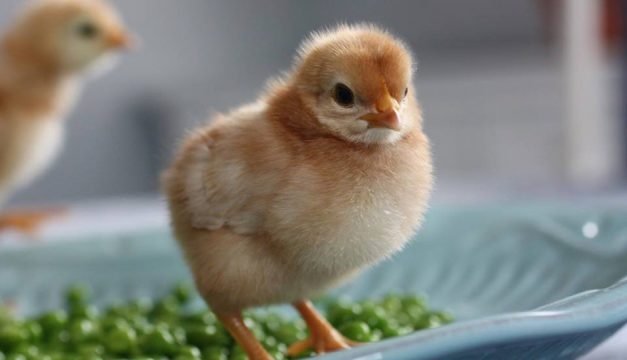
CHICK PEAS: Maureen Breen’s hen Michelle — named after the First Lady — in 2010, standing in a bowl of peas. (Photo courtesy Maureen Breen.)
“It is time for Philadelphia to modernize and become more reasonable about this issue,” challenges Breen. “We want equality for all chickens. They should be legally the same as a cat or a dog.”
Breen says she started riding the chicken-keeping wave in 2010, when she bought chickens to help reach her sustainability goal of providing 40 percent of her own food.
“That’s what most Americans were doing before World War II,” she explains. (The government used to encourage every American to keep chickens at home, with patriotic slogans like “Uncle Sam Expects You to Keep Hens and Raise Chickens.”) “But finding a protein source in vegetables is hard, and so I got chickens.”
Originally, all was well with her chicken coop. But then a neighbor complained.
“He was on house arrest, so he was bored and bitter,” says Breen. ACCT came out, and she had to send her chickens to what she calls “the chicken underground.”
Later, the negative nelly neighbor’s house was foreclosed upon, and the rest of the neighbors told her they wanted her to bring the chickens back. So she did. But her experience with the city convinced her to try to do something about the ordinance.
Since then, her group has drafted sample legislation that would allow Philadelphians to own chickens. But unlike Baltimore’s exception for roosters (an exception also made by New York City and Chicago, among other cities), Breen wants all chickens — not just hens — to be permitted.
“They can be a little noisy,” Breen admits of the boy birds. “But we have an animal noise ordinance, which applies to loud, barking dogs. So the city can enforce that if there are complaints about rooster noise. We say all chickens, because this city contains a culturally diverse group of people, and some cultures really like roosters. They protect the flocks, and they are gorgeous. We are representing a broad constituency.”
•
THERE’S REALLY NO TELLING how big Philadelphia’s chicken-loving constituency is. Some of the cities that now allow residents to keep backyard chickens also require a permit or license for it, so it’s easier for those places to track their chicken populations. In a city like Philadelphia, where the chickens exist only in a black market world — a chicken underground of sorts — it’s a mystery.
But here’s a piece of anecdotal evidence that suggests that urban chickens are big in Philly: The Weavers Way food cooperative in Mt. Airy sells chicken feed, and the amount that the shop moves monthly suggests they are feeding some 600 chickens, maybe more. And that’s just one store in one (admittedly very crunchy) Philadelphia neighborhood.
And it wasn’t exactly hard for us to find Philadelphians with chickens. We identified dozens just by asking around.
Linette in Roxborough, who asked us not to use her last name for fear of having the city come after her, has free-ranging chickens in her backyard, and so do her neighbors a few doors down. She and the neighbors enjoy the eggs.
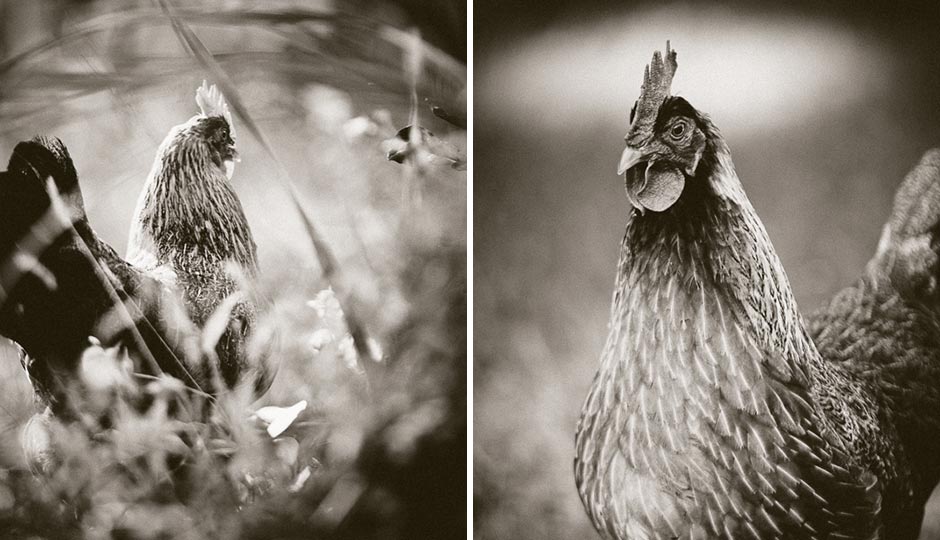
Photographs courtesy of Linette
“It’s been very well received,” she says. “Well, my neighbor did have a rooster, and that was a bit tough. But it’s kind of known within the backyard community that you just don’t have a rooster.”
Linette’s mother was Puerto Rican, and Linette visited the island every summer as a child. And there were always chickens around, though not just for food.
“I have an uncle who still raises chickens for cockfighting in Puerto Rico,” she says. “But I can’t even eat my chickens. We had a chicken die, and we just buried it. I wasn’t about to pluck the feathers and do all that.”
But West Philadelphia’s Taylor Kyuk-White, who works for non-profit Neighborhood Bike Works and started raising chickens last year, believes that eating the chickens is an important part of the process.
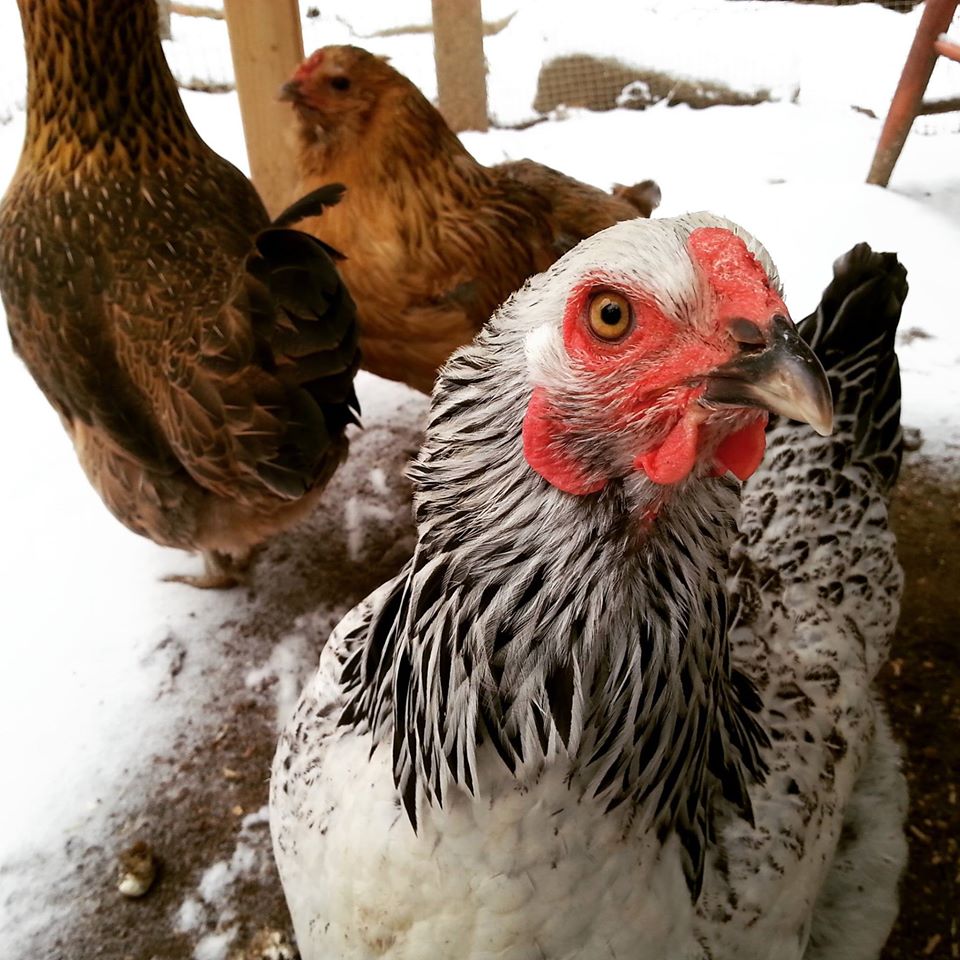
WHO’S HUNGRY?: Taylor Kuyk-White’s birds Tooskie (front) and Namtarn Peep and Reginald (rear) enjoying a wintry day. (Photo courtesy Taylor Kyuk-White.)
“I plan to see their full life cycle through and harvest them for their meat when the time comes,” she tells us. Kyuk-White says that while she has defeathered a chicken, she hasn’t slaughtered one just yet. “But I have slaughtered other animals. As long as I am going to eat meat, I want to have some first-hand experience every now and again. Having chickens keeps me much more mindful and aware of factory farming and the things I eat.”
At this point, her hens’ eggs are the primary animal product that she consumes.
Meanwhile, 14-year-old Elizabeth (her parents asked us to only identify her as such) in Overbrook Farms is a passionate chicken person and loves eating the eggs, though she complains that she can’t sell them because she’d have to get a “commercial activity license.” (The government makes things so difficult.) Elizabeth is the eldest of eight (yes, eight) children, and the family eventually bought eight chickens, one for each kid.
“One of my younger brothers named his Rhode Island Red chicken ‘Red,'” she tells us. “He isn’t exactly creative.”
Elizabeth can’t understand for the life of her why Philadelphia insists on turning her into a law-breaker just because she likes to raise chickens.
“They should lift the ban on hens, at least,” she says. “I can see why you wouldn’t want roosters. They really do make a ton of noise. But very rarely do hens make any noise other than a low clucking sound. So there’s no noise problem. And they don’t attack the neighbors. They are really very nice pets.”
They are also good for science experiments, it turns out. During the most recent school year, Elizabeth enlisted her hens in her science fair project, in which she set out to determine whether a chicken’s diet would have an impact on the flavor of its eggs.
“I tried ginger at first, but the chickens wouldn’t eat ginger,” she reports. “They like apples. But the eggs from that batch tasted like an apple’s skin, which wasn’t good. And the fish, those eggs were awful, too. Eventually, I ran out of time.”
Alas, it turns out that Elizabeth’s love affair with her chickens was also running out of time, as she recently went from a flock of eight to just one: her brother’s creatively named chicken, Red.
Did a neighbor complain? Did PETA get wind of her feeding her chickens ginger? Did ACCT come out and set her straight? Nope.
“My brother opened up the chicken coop and apparently never closed it,” she sighs. “And, well, we live next to Morris Park, so there are a bunch of foxes that live in there. A fox got into the coop, and just one chicken survived.”
•
FOR NOW, THE LEGAL future of backyard chickens in Philadelphia is uncertain. Maureen Breen says that O’Neill has repeatedly refused to meet or speak with her about backyard chickens, and he also didn’t reply to our request for comment. She has presented her sample legislation to Councilman Mark Squilla, whom she says has been “awesome” about the whole thing. And some of the other current City Council members were among the “nay” votes back when O’Neill’s bill came up, so there could be some support there.
One notable vote in favor of banning chickens back then was none other than Jim Kenney, the former councilman-turned-Democratic nominee for Philadelphia mayor. Kenney, barring anything traumatic or over-the-top scandalous, will be the next mayor of Philadelphia, so we asked him if he’d consider reversing his stance on backyard chickens.
“Jim has been largely focused on education, job creation, poverty and community-police relations during this campaign,” a campaign spokesperson told us. (Priorities!) “So he hasn’t had a moment to ponder the urban chicken query, but he will give the issue the proper consideration if he’s successful.”
But first, someone on City Council would need to propose the bill, an act that would fly in the face of sitting council member O’Neill. Councilman Squilla, who has only been playing the City Hall game for a few years, tells us he’s sympathetic to the cause but not 100-percent convinced that citywide legalization is the way to go.
“I’d be in favor of a pilot program to test it out, perhaps in my district in the Fishtown area,” he says. “Let’s see what the response is from the community. Sometimes the things we do have unintended consequences.”
They sure do, like waking your neighbors up at 4 a.m. on a daily basis. Speaking of which, we checked in with Robert Drake to see how life has changed since the demise of the Fourth and Dickinson zoo.
“It’s quiet and back to normal,” says Drake today. “I’m back to allowing our dog Nomi to wake me up at 6 a.m., a tad later than the roosters. It’s nice.”
Follow @VictorFiorillo on Twitter.


